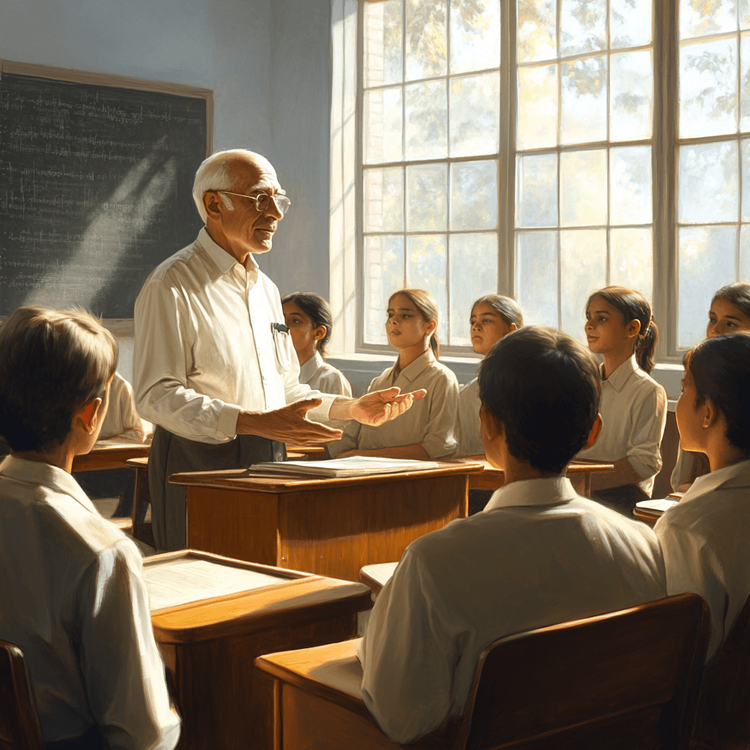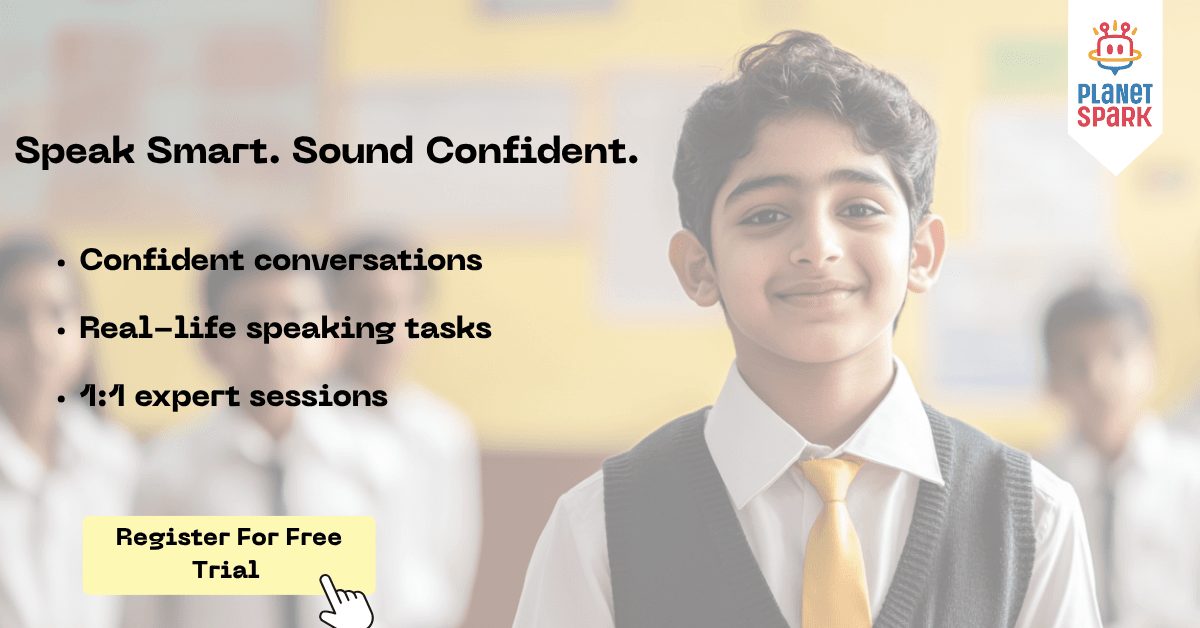Carl Rogers Theory of Personality Explained.
Last Updated At: 25 Jul 2025
9 min read

Table of Contents
- Who Was Carl Rogers
- Core Concepts of Carl Rogers’ Theory of Personality
- The Fully Functioning Person
- Carl Rogers in Education
- Real-Life Applications of Carl Rogers’ Self Theory of Person
- How Kids Can Learn From Carl Rogers’ Personality Theory
- Carl Rogers’ Theory in the Context of Modern Psychology
- The Role of Empathy in Carl Rogers’ Self Theory of Personali
- The Fully Functioning Person: The Ideal Outcome
- Applying Carl Rogers' Theory in the Classroom
- PlanetSpark Tip for Parents & Educators:
- Implications for Career and Leadership Development
- Criticism of Carl Rogers’ Theory
- Comparison: Carl Rogers vs. Freud
- Digital Age Relevance
- Conclusion:
- FAQs
Understanding what makes people who they are has fascinated psychologists for decades. Among the most influential thinkers in humanistic psychology is Carl Rogers, whose theory of personality revolutionized how we view the human mind. The Carl Rogers theory of personality centers on the idea of self, growth, and actualization, offering a compassionate and optimistic view of human nature.
This blog explores Carl Rogers’ self theory of personality, its components, applications in real life, and how it still shapes education, parenting, therapy, and personal growth today.
Who Was Carl Rogers
Carl Ransom Rogers (1902–1987) was an American psychologist and one of the founders of the humanistic approach in psychology. He is best known for developing the client-centered therapy approach and the Carl Rogers theory of personality, which emphasized a person’s subjective experience and their innate drive toward personal growth.
Rogers believed that every human being has the potential to grow, learn, and become the best version of themselves- a process he called self-actualization.
Core Concepts of Carl Rogers’ Theory of Personality
The Carl Rogers self theory of personality focuses on the individual's subjective view of the world. Here are the fundamental components:
1. The Self-Concept
The self-concept is how a person views. It includes:
Self-image: How we see ourselves (e.g., "I am kind").
Ideal self: Who we want to become (e.g., "I want to be more confident").
Self-worth: How much value we place on ourselves.
A healthy self-concept leads to positive mental health, while a distorted self-concept can result in low self-esteem and inner conflict.
2. Unconditional Positive Regard
Rogers emphasized that individuals flourish when they receive unconditional positive regard- love and acceptance without any conditions.
For example, a child who is loved only when they behave a certain way may develop a conditional self-worth. But a child who feels accepted no matter what is more likely to develop a strong and stable sense of self.
3. Congruence vs. Incongruence
Congruence is when your self-image matches your experiences.
Incongruence happens when there's a gap between how you see yourself and what you experience.
According to Carl Rogers' theory of personality, psychological problems arise when there's high incongruence.
Want to Help Your Child Develop Self-Confidence?
PlanetSpark's English speaking and creative writing programs build self-worth, confidence, and communication skills- core values aligned with Carl Rogers’ humanistic principles.
Book a Free Trial Class

The Fully Functioning Person
According to Carl Rogers' self theory of personality, the ideal person is a fully functioning person- someone who:
Is open to experiences
Lives in the moment
Trusts their feelings
Has freedom of choice
Is creative
Strives to reach their full potential
This idea aligns with Maslow’s concept of self-actualization but focuses more on emotional growth and authenticity
Carl Rogers in Education
Rogers strongly believed that education should focus on the learner’s experience, not just rote memorization. His student-centered learning model respects individual needs and encourages self-directed learning.
Teachers using Carl Rogers' theory of personality principles:
Treat students with respect and empathy
Create emotionally safe classrooms
Encourage open dialogue and curiosity
Transform the Way Your Child Learns English!
At PlanetSpark, we believe in nurturing each child’s potential using personalized, student-focused methods, just like Carl Rogers did. Join PlanetSpark English Courses
Real-Life Applications of Carl Rogers’ Self Theory of Personality
A. Parenting
Parents who adopt unconditional positive regard help their children develop a healthy self-concept. Instead of saying, “You’re a bad kid,” say, “That behavior wasn’t okay, but I love you.”
B. Therapy
Carl Rogers’ client-centered therapy is still widely used. Therapists offer empathy, genuineness, and acceptance, helping clients resolve inner conflicts and discover their true selves.
C. Workplace Coaching
Modern leadership training uses Rogers’ ideas to promote employee growth, emotional intelligence, and authentic communication.
How Kids Can Learn From Carl Rogers’ Personality Theory
Kids benefit tremendously when taught in an environment that fosters:
Open communication
Empathy
Non-judgmental feedback
Opportunities for self-expression
By using Carl Rogers' theory of personality, educators and parents can help children express themselves in English confidently and without fear.
Give Your Child the Freedom to Express!
PlanetSpark’s spoken English and grammar courses empower kids to communicate boldly and clearly, with confidence and emotional safety.
Try a Free Class Today
Carl Rogers’ Theory in the Context of Modern Psychology
Even decades after its introduction, Carl Rogers' theory of personality continues to influence how we understand the human mind and behavior. His work laid the foundation for positive psychology, a field that emerged in the late 20th century with the core aim of studying what makes life most worth living, focusing on strengths rather than disorders.
Modern psychologists like Martin Seligman and Mihaly Csikszentmihalyi drew inspiration from Rogers' ideas when shaping their theories on flow, optimism, resilience, and well-being. These concepts are now widely used in therapy, coaching, leadership development, and educational reform, proving that Rogers’ self-theory is more relevant than ever.
Unlike the deterministic approach of Freud or the rigid conditioning models of behaviorism, Rogers believed in agency- the idea that people can choose to grow, heal, and flourish. That philosophy is crucial in today’s mental health practices that focus on empowerment, strength-building, and emotional awareness.

The Role of Empathy in Carl Rogers’ Self Theory of Personality
Rogers famously identified empathy as one of the “core conditions” required for personality development. But empathy in Rogers’ context is more than just “putting yourself in someone else’s shoes.” It means deeply understanding a person’s internal frame of reference, without judgment or agenda.
This form of empathy enables individuals to process their emotions, resolve inner conflicts, and develop a more congruent and stable sense of self. In Carl Rogers’ self theory of personality, empathy is not an optional trait- it’s a necessity for psychological growth.
In therapeutic or educational settings, this means that the listener (a counselor, teacher, or even a parent) mirrors the speaker’s feelings with kindness and validation, allowing them to explore thoughts more freely and safely.
The Fully Functioning Person: The Ideal Outcome
One of Rogers' most compelling contributions is the idea of the "fully functioning person." According to Carl Rogers' theory of personality, such individuals embody the following characteristics:
Openness to experience: They are emotionally honest, curious, and non-defensive.
Existential living: They live in the moment, appreciating experiences as they come.
Organismic trust: They trust their feelings and instincts.
Experiential freedom: They feel in control of their life and choices.
Creativity and adaptability: They are open to change and novelty.
Self-congruence: Their actual experiences align with their self-concept.
This ideal is not a static endpoint but a dynamic process. It's about becoming, rather than being. Rogers believed anyone could strive to become more fully functioning if placed in the right environment with unconditional positive regard.
Applying Carl Rogers' Theory in the Classroom
In educational environments, Rogers' principles support the whole-child approach, where teachers consider emotional, social, and psychological development alongside academic performance.
Key Strategies for Teachers Based on Rogers’ Theory:
Encouraging Self-Directed Learning
Students are seen as active participants in their education. Instead of spoon-feeding information, teachers guide students to ask questions, explore interests, and take initiative.Building Trust and Emotional Safety
A classroom based on trust fosters creativity and risk-taking. Students are less afraid to fail and more willing to try new things.Listening to Student Voices
Just as therapists listen to clients, teachers listen to learners, validating their feelings, doubts, and goals.Growth-Oriented Feedback
Instead of focusing only on grades, feedback includes praise for effort, creativity, and personal progress, promoting intrinsic motivation.
This aligns with modern SEL (Social and Emotional Learning) practices, where emotional intelligence, self-awareness, and communication are taught alongside math and science.
PlanetSpark Tip for Parents & Educators:
Want to raise emotionally intelligent, expressive, and self-aware children? Join PlanetSpark’s Communication Skills Program designed for young learners. We integrate key aspects of emotional growth with language development.
Try a FREE Demo Class with PlanetSpark today!
Implications for Career and Leadership Development
Rogers’ theory is not just for children and therapy- it applies powerfully in the workplace and leadership coaching too. Leaders who adopt Rogers' values are:
Empathic communicators
Transparent in goals and vision
Open to feedback
Focused on psychological safety
In a corporate setting, this leadership style creates trust, creativity, and engagement, leading to higher job satisfaction and productivity. Personality development programs that borrow from Rogers’ humanistic approach often emphasize active listening, emotional self-regulation, and confidence-building- all traits of a fully functioning person.
Criticism of Carl Rogers’ Theory
While widely celebrated, Rogers' theory has some critiques:
It may be too optimistic about human nature.
It lacks empirical measurement tools.
It may oversimplify complex behaviors.
However, Carl Rogers' self-theory of personality remains relevant and impactful in modern psychology and education.
Comparison: Carl Rogers vs. Freud
| Feature | Carl Rogers | Sigmund Freud |
|---|---|---|
| View of Human Nature | Inherently good | Driven by unconscious desires |
| Focus | Conscious experience and growth | Unconscious conflict and repression |
| Therapy Type | Client-centered | Psychoanalysis |
| Core Concept | Self-concept and actualization | Id, Ego, Superego |
Digital Age Relevance
In the age of social media, self-concept is often influenced by external validation- likes, comments, and shares. Teaching children and teens to value internal validation aligns with Carl Rogers theory of personality, promoting long-term mental well-being.
Want to Teach Your Child Healthy Self-Expression
PlanetSpark's curriculum is designed to help kids speak freely, think critically, and grow confidently in both academics and life. Explore Courses
Conclusion:
Carl Rogers’ theory of personality remains one of the most influential and human-centered approaches in modern psychology. By focusing on concepts such as the self, unconditional positive regard, and self-actualization, Rogers placed the individual at the heart of psychological development. His person-centered approach challenged more rigid and deterministic views of personality, offering instead a model rooted in empathy, authenticity, and personal growth.
FAQs
1. What is the main idea of Carl Rogers’ theory of personality?
Ans. The main idea is that every person has a self-concept and a natural drive to grow and become their ideal self, especially when given unconditional positive regard.
2. How does Carl Rogers' self theory of personality differ from Freud’s theory?
Ans. Rogers focuses on conscious growth and personal experience, while Freud emphasizes unconscious drives and conflicts.
3. What are the key elements of Carl Rogers' self theory of personality?
Ans. The key elements are self-concept, congruence, unconditional positive regard, and the fully functioning person.
4. How can educators apply Carl Rogers' theory in classrooms?
Ans. By creating emotionally safe environments, respecting students’ feelings, and encouraging self-directed learning.
5. Is Carl Rogers’ theory still relevant today?
Ans. Yes! Especially in education, therapy, leadership, and parenting, his humanistic and student-centered approaches continue to guide modern practice.
Personalized Communication Report
Record a video to get a AI generated personalized communication report for your child
Select Learner's Class

Hi There, want to try these
tips for your child with
LIVE with our expert coach?
Let's check your child's
English fluency
